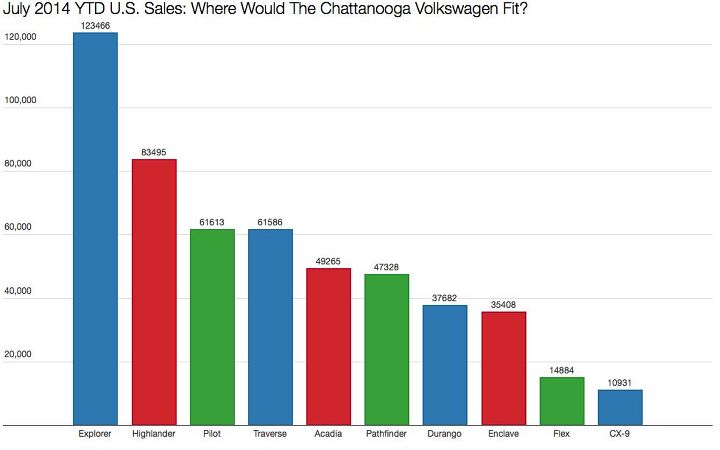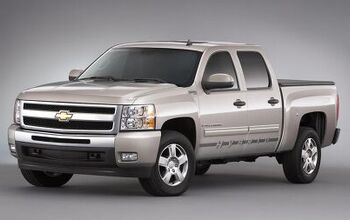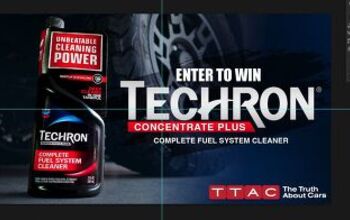9 Views
What Can The Chattanooga CrossBlue Do For You?
by
Timothy Cain
(IC: employee)
Published: August 12th, 2014
Share
This much we know: the Volkswagen brand sold more new vehicles in America in 2012 than in any year since 1973. The company predicted moderate growth for the Volkswagen brand in 2013, but sales fell 7%. Still, by topping 400,000 units, Volkswagen sales were 35% higher than they were a decade prior. Through the first seven months of 2014, Volkswagen brand sales are down 14% in the United States, or 13% if we exclude the transitioning Golf lineup.We also know that the company’s bigger SUV, the Touareg, is tasked with taking the fight to premium utility vehicles. The smaller Tiguan, mostly unchanged since 2008, has 36% less cargo capacity behind the rear seats than Honda’s CR-V does.
Yet other automakers – Toyota, Honda, Nissan, Ford, Hyundai, Chevrolet, Kia, Chrysler/Dodge – were selling significantly more midsize cars, bringing some perspective to the Passat’s record-setting sales year. The Passat’s 6% decline in 2013, even as the midsize sector grew, and its 12% decline so far this year (overall midsize cars are slightly south of level) is disheartening.Nevertheless, we can assume there will be a relatively large number of buyers attracted to a three-row VW people carrier. What impact could it have in terms of rescuing the brand’s U.S. fortunes? Consider three retroactive scenarios, as if the production CrossBlue arrived seven months ago at full steam.Scenario the CrossBlue is a top-of-the-pack Ford Explorer rival. Possible? No, but here are the figures. Had the Chattanooga SUV generated 123,466 sales over the last seven months, had all else at Volkswagen continued as is, brand-wide volume would be up 37% to 333,163 units year-to-date (up from 242,571 during the same period in 2013), turning Volkswagen into a Subaru-beater, but not quite a Kia-catcher.Scenario the CrossBlue sells half that well. General Motors has sold 61,586 Traverses so far this year (in addition to 49,265 GMC Acadias and 35,408 Buick Enclaves), a fair mid-pack yardstick for the Chattanooga SUV. With numbers like that, Volkswagen brand sales would be up 12% to 271,283 units this year, enough to overtake Ram, the 12th-ranked auto brand in America at this moment.Scenario the CrossBlue is CX-9-like rare. Mazda has sold 10,931 CX-9s so far this year, nearly triple what Volkswagen has done with the Touareg, but less than a quarter of what Nissan does with the Pathfinder. In this case, by driving Volkswagen up to 220,628 year-to-date sales, the Chattanooga SUV would not have stopped the brand’s losses over the last seven months – sales would be down 9% instead of 14%.Volkswagen’s recent downward spiral in the U.S. has not been replicated in other parts of North America. The Volkswagen division is Mexico’s second-ranked brand behind Nissan, and Volkswagen brand sales are up 3% in a market that has fallen less than 1%.2014 will end as the brand’s fifth consecutive year of growth in Canada, where their current market share, 3.5%, is far higher than the brand’s 2.2% year-to-date showing in the U.S. When asked about the differences between VW Canada’s surge and VW USA’s difficulties, Volkswagen Canada’s media relations manager, Thomas Tetzlaff, naturally wasn’t going to point out the errors of VW USA’s ways: “More than five years ago, we decided that if Volkswagen Canada was going to be a volume player in this country we would have to fine-tune our products, and fine-tune our pricing to match consumer wants and needs.” Yet it’s clear that the job of fine-tuning has been done more effectively north of the border than it has south of the border.Volkswagen’s subsidiaries have also proven capable of understanding the North American market. Porsche sells more vehicles seemingly at will, and 2014 will once again be a record-setting year for Audi, which is outselling Cadillac this year in America. Sales at Volkswagen, on the other hand, have declined in 16 consecutive months.
#Crossblue
#CrossoverSales
#FutureProducts
#MidsizeSUVs
#U.S.AutoSales
#Volkswagen
#VolkswagenCrossblue
Timothy Cain
More by Timothy Cain
Published August 12th, 2014 9:30 AM
Latest Car Reviews
Read moreLatest Product Reviews
Read moreRecent Comments
- Sayahh I do not know how my car will respond to the trolley problem, but I will be held liable whatever it chooses to do or not do. When technology has reached Star Trek's Data's level of intelligence, I will trust it, so long as it has a moral/ethic/empathy chip/subroutine; I would not trust his brother Lore driving/controlling my car. Until then, I will drive it myself until I no longer can, at which time I will call a friend, a cab or a ride-share service.
- Daniel J Cx-5 lol. It's why we have one. I love hybrids but the engine in the RAV4 is just loud and obnoxious when it fires up.
- Oberkanone CX-5 diesel.
- Oberkanone Autonomous cars are afraid of us.
- Theflyersfan I always thought this gen XC90 could be compared to Mercedes' first-gen M-class. Everyone in every suburban family in every moderate-upper-class neighborhood got one and they were both a dumpster fire of quality. It's looking like Volvo finally worked out the quality issues, but that was a bad launch. And now I shall sound like every car site commenter over the last 25 years and say that Volvo all but killed their excellent line of wagons and replaced them with unreliable, overweight wagons on stilts just so some "I'll be famous on TikTok someday" mom won't be seen in a wagon or minivan dropping the rug rats off at school.



































Comments
Join the conversation
I expect the CrossBlue to sell worse than the Nissan Pathfinder. In my opinion, the best example of the core competency of Volkswagen is the Golf/GTI. Unfortunately for Volkswagen, their core competency in building somewhat premium fun to drive hatchbacks doesn't match American tastes. Making the Jetta and Passat larger and less expensive did help sales, but not as much as Volkswagen had hoped. Part of the problem is the new larger models lost much of the fun and somewhat premium characteristics that made people want to buy a Volkswagen in the first place. Ideally, the NA Jetta, Passat, and CrossBlue would feel more like larger relatives of the Golf/GTI. Real Volkswagen suspension tuning, but with room for rear-facing child car seats. The best way for Volkswagen to overcome lingering concerns about reliability would be for Volkswagen to match the Hyundai and Kia warranty. American consumers seem willing to give car brands a 2nd chance if the brand reduces the risk of getting stuck with a lemon. If reliability really is improved to match competitors, Volkswagen won't have to pay much more in warranty claims.
S2k CHRIS you still have it wrong. VW still offers 3/36 full coverage and 5/60 engine and drive train coverage. They still offer free 3 years full service. My 2011 GTI received its final free service this year.